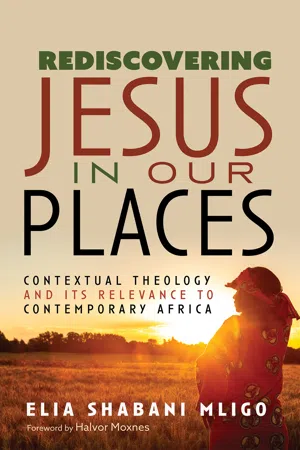![]()
1
Contextual Theology and the Concept of Place
INTRODUCTION
In one of the working days of the week, after my friend and I had taken lunch at the University cafeteria, we relaxed on our seats. One among fellow members of staff joined us and initiated conversations. He asked us: “Do you believe that Jesus turned water into wine as stipulated in John’s gospel?” We kept silent, just looking at him in a perplexed stance because the question was too abrupt for us to respond. He continued, “I, myself, don’t believe in Jesus who changes water into alcoholic wine so that people may drink it and become drunkard. I don’t believe in Jesus who drinks alcohol which is forbidden in the Bible. I believe in Jesus who drinks non-alcoholic wine.” My friend with whom I sat joined the conversation; he asked, “Where would Jesus get wine without alcohol?” The member of staff replied with righteous indignation saying, “I do not know, but what I know is that my Jesus could not drink alcoholic wine.” The following conversations were greatly heated and ended with disagreements.
In the above conversations we find two representations of Jesus: Jesus who changes water into alcoholic wine and drinks it; and Jesus who changes water into non–alcoholic wine and drinks it. The two representations of Jesus are enshrined in the mindsets of the two conversing friends, each representing the way he has come to discover Jesus in his Christian life. The question of who Jesus is to me or any of the conversing friends has been answered well, each one of them according to his discovery. This is what entails the rediscovery of Jesus of the Bible according to one’s own place, according to one’s own location. The above conversation indicates that not all people in the world perceive Jesus in the same way. Jesus is perceived differently in various locations and abodes; yet each perception is closer to the real Jesus! Hence, Jesus who is relevant to time and place depends greatly on the way people interpret him according to their cultural or religious lenses. The task of this chapter is to lay a foundation in regard to contextual theology and its relation to people’s places of abode. It discusses the way it emerged, the challenges it faces, the way people came to be interested in it despite the various challenges, and the various forms of this kind of theology.
THE CONCEPT OF PLACE
Before venturing the main tenets of the chapter, we first introduce the concept of place and its relation to contextual theology. In his book Putting Jesus in His Place, Moxnes has primarily argued for the Jesus of history located in the Jewish context. Moxnes portrays Jesus who can be understood basing on his Jewish context while recognizing the various places occupied by minority groups in the 21st century. As Moxnes sees, place has been forgotten in scholarship despite its importance. We always speak of place in various references of our communication: things being ‘in place,’ being ‘out of place,’ things having ‘their specific places,’ etc. All these references indicate the importance of place as an abode.
In the introduction to his Thesis, Inge writes: “Our very existence as embodied beings means that at any given moment we will be in one particular place. We must have a place in which to stand—place is as necessary as food and air to us. The events that shape our lives happen in particular places, nothing we do or are, nothing that happens to us is unplaced.” How then should we conceptualize the meaning of the concept of place? As Inge, taking ideas from Harvey, has just pointed out: “the term ‘place’ has an extraordinary range of metaphorical meanings: ‘We talk about the place of art in social life, the place of women in society, our place in the cosmos, and we internalise such notions psychologically in terms of knowing our place, or feeling that we have a place in the affections or esteem of others.’ He goes on to remind us that by `putting people, events and things in their proper place’ we express norms.” These words cement on the importance of place, not only for physical human experiences, but also emotional and spiritual experiences.
In addition, Cresswell provides the following definition of the concept of place:
In order to illustrate this definition, Cresswell provides an example of Baghdad in Iraq:
Therefore, it is in this illustration that Cresswell makes the conceptualization of concepts of location, locale and sense of place understood clearly.
Moreover, the value and importance of place was first discovered by the Greeks. The Greeks, particularly Plato, used the term chora to mean ‘space or plac...
